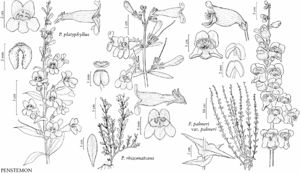familyPlantaginaceae
genusPenstemon
subgenusPenstemon subg. Penstemon
sectionPenstemon sect. Spectabiles
speciesPenstemon palmeri
Difference between revisions of "Penstemon palmeri var. palmeri"
IllustratedEndemic
FNA>Volume Importer |
imported>Volume Importer |
||
| (6 intermediate revisions by 2 users not shown) | |||
| Line 1: | Line 1: | ||
{{Treatment/ID | {{Treatment/ID | ||
|accepted_name=Penstemon palmeri var. palmeri | |accepted_name=Penstemon palmeri var. palmeri | ||
| − | |accepted_authority= | + | |accepted_authority= |
|publications= | |publications= | ||
|special_status={{Treatment/ID/Special_status | |special_status={{Treatment/ID/Special_status | ||
|code=F | |code=F | ||
| − | |label= | + | |label=Illustrated |
}}{{Treatment/ID/Special_status | }}{{Treatment/ID/Special_status | ||
|code=E | |code=E | ||
| Line 26: | Line 26: | ||
|elevation=800–2800 m. | |elevation=800–2800 m. | ||
|distribution=Ariz.;Calif.;Colo.;Idaho;Nev.;N.Mex.;Utah;Wash.;Wyo. | |distribution=Ariz.;Calif.;Colo.;Idaho;Nev.;N.Mex.;Utah;Wash.;Wyo. | ||
| − | |discussion=<p>Because of its stature and showy flowers, var. palmeri is seeded widely in the western United States along roadsides after construction. Populations in Colorado, Idaho, Washington, and Wyoming are introduced; some in New Mexico also appear to have resulted from seeding.</p> | + | |discussion=<p>Because of its stature and showy flowers, <i></i>var.<i> palmeri</i> is seeded widely in the western United States along roadsides after construction. Populations in Colorado, Idaho, Washington, and Wyoming are introduced; some in New Mexico also appear to have resulted from seeding.</p> |
|tables= | |tables= | ||
|references= | |references= | ||
| Line 35: | Line 35: | ||
-->{{#Taxon: | -->{{#Taxon: | ||
name=Penstemon palmeri var. palmeri | name=Penstemon palmeri var. palmeri | ||
| − | + | |authority= | |
| − | |authority= | ||
|rank=variety | |rank=variety | ||
|parent rank=species | |parent rank=species | ||
| Line 49: | Line 48: | ||
|publication title= | |publication title= | ||
|publication year= | |publication year= | ||
| − | |special status= | + | |special status=Illustrated;Endemic |
| − | |source xml=https:// | + | |source xml=https://bitbucket.org/aafc-mbb/fna-data-curation/src/2e0870ddd59836b60bcf96646a41e87ea5a5943a/coarse_grained_fna_xml/V17/V17_609.xml |
|genus=Penstemon | |genus=Penstemon | ||
|subgenus=Penstemon subg. Penstemon | |subgenus=Penstemon subg. Penstemon | ||
Latest revision as of 20:35, 5 November 2020
Distal cauline leaves connate-perfoliate. Thyrses: peduncles and pedicels glandular-pubescent. Flowers: calyx lobes glandular-pubescent; corolla tube 4–6 mm; pollen sacs 1.8–2.4 mm. 2n = 16.
Phenology: Flowering May–Jul.
Habitat: Washes, roadsides, canyon floors, creosote shrublands, pinyon-juniper woodlands.
Elevation: 800–2800 m.
Distribution
Ariz., Calif., Colo., Idaho, Nev., N.Mex., Utah, Wash., Wyo.
Discussion
Because of its stature and showy flowers, var. palmeri is seeded widely in the western United States along roadsides after construction. Populations in Colorado, Idaho, Washington, and Wyoming are introduced; some in New Mexico also appear to have resulted from seeding.
Selected References
None.
Lower Taxa
None.
